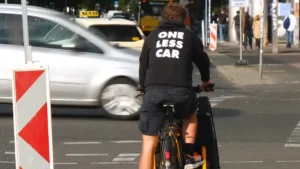
European Transportation Revolution
min read
A transportation revolution is underway in Europe.
Leaders banning cars in city centers in an effort to ease traffic and curb greenhouse emissions. Amsterdam, Copenhagen, Paris all drastically reducing the number of vehicles on the streets in exchange for bicycles and walking paths.
The trend, beginning in Spain’s Pont Vedra in 1999 when cars were banned in most of the city, a move that reduced air pollution by nearly 70% over 20 years. Similar low emission zones are on the rise increasing by 40% in Europe since the start of the pandemic. But some countries are having a hard time implementing such policies, while others are challenging the premise of the idea altogether.
The dilemma is playing out in the German capital of Berlin a city that was moving towards outright banning cars of the city center, but began to run into problems during the execution of the plan. The Christian Democrat Party controls Berlin for the first time in over two decades, largely due to its position to emission-free zones. It ran on a platform of walking back what it described as unfair mobility restrictions for citizens and is quickly acting on its campaign promise.
Vehicles are returning to areas once labeled as car-free and bike path projects are being put on hold pending additional review. It’s a blatant rebuke to newly implemented climate friendly policies, with voters rejecting the architects in a February election and conservative leaders giving the people the power to address the issue themselves. It’s an approach gaining popularity across Europe most recently being applied on a larger scale in the United Kingdom. The UK is scrapping a ban on gas cars which was set to go into effect in 2030 but is now being pushed back to 2035.
